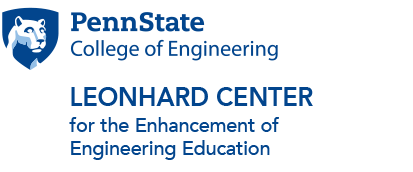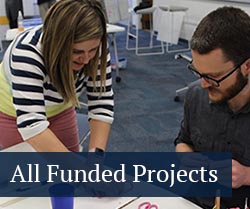
Project Highlights
Digital Badges for Skill-enrichment
In today’s global workplace, engineers must increasingly develop skills above and beyond their technical expertise. Skills like communication, collaboration, planning, delegating, and a business acumen differentiate students for entry-level jobs and set them up for success. These skills are core to leadership and are the central focus of a digital badging effort led by the School of Engineering Design, Technology, and Professional Programs’ (SEDTAPP) Engineering Leadership and Entrepreneurship programs. The digital badges were designed to provide basic knowledge on key non-technical skill development to support students as they work and lead technical teams throughout their engineering career. Three digital badges are available as standalone courses or as steppingstones for students pursuing a minor in entrepreneurship and innovation:
- Engineering Leadership Fundamentals: This digital badge focuses on the differences between leadership and management, self-awareness to support team formation, and strategies for effective leadership of technical teams.
- Project Management Fundamentals: The planning and execution phase of project management is the focus of this badge, introducing delegation skills and giving students an opportunity to apply tools like Gantt charts and work breakdown structures to manage task completion for projects.
- Entrepreneurship Fundamentals: This badge introduces students to the entrepreneurial mindset, value proposition, customer discovery, intellectual property, and financials.
Alumni working in industry create videos to supplement the asynchronous model of delivery, providing real-world cases that demonstrate the applications of the badge’s various concepts.
After completion, students receive a digital badge that can be included on their LinkedIn account pages or linked on their résumés. This effort aims to introduce more College of Engineering students with these important skills, as well as familiarize them with the Engineering Leadership Development and Entrepreneurship programs offered by SEDTAPP.
More information is available here.
New Paradigm for Ph.D. Candidate Curriculum Based on Structured Learning Experiences
Faculty Principal Investigators: Cliff Lissenden, Francesco Costanzo, Bruce Gluckman, Akhlesh Lakhtakia, Michael Lanagan, Joseph Cusumano, and Ibrahim Ozbolat
This project is a critical part of a larger effort to revolutionize graduate education in Engineering Science and Mechanics (ESM) in order to achieve the following outcomes:
- At the department level, train incoming Ph.D. students to quickly become independent researchers;
- Provide graduate students with opportunities for structured self-directed learning;
- Introduce professional skill training into the ESM Ph.D. curriculum;
- Increase the number of Ph.D. applicants to ESM, and ultimately the number of Ph.D. students in ESM;
- Position ESM to write proposals for externally funded training grants.
From this project, an introduction to graduate school in ESM course has been developed and implemented to help meet the above goals of the project.
RE Energizing AE 124: Building Engineering and Humanity
Faculty Principal Investigators: Somayeh Asadi, Gregory Pavlak; Ryan Solnosky, Kevin Houser, Thomas Boothby, and M. Kevin Parfitt
First Year Seminars are broadly understood to play a vital role in the achievement of learning and development objectives as well as the attraction and retention of students. This project seeks to enhance the First Year Seminar offerings in the Department of Architectural Engineering (AE 124) through the development of a comprehensive new approach intended to:
- Develop shared learning objectives and activities across all sections of AE 124 that are responsive to the evolution of AE and the current generation of students;
- Advance course content through engagement of multiple AE faculty in modular and specialty sections as well as common activities that emphasize the role of sustainable building engineering in service to humanity;
- Develop a set of shared assessment instruments; and
- Launch a continuous improvement and ongoing innovation effort for AE 124 to ensure its contribution to launching the careers of World Class Engineers while also contributing to the attraction and retention of students enrolled in Architectural Engineering.
From this project, common learning objectives have been adopted for AE 124 and multiple sections of a revised AE 124 have been implemented to meet the above goals of the project.



